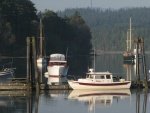1800+ miles to go buy a boat in Eastern Texas. I like to have a tool kit that has everything i could possibly need for roadside issues. I will buy fresh tires for trailer before I leave with boat, will inspect/grease bearings/hubs, probably have spares with me.
I am taking full sets of tools, metric/standard. Floor jack, jack stands, grease guns, electrical repair supplies, hose clamps, plenty of various tapes/clamps/hoses/ropes/straps........I keep a pretty thorough kit in my truck as it is.
Packing my kit and making lists right now as I may be leaving this Friday..
what am I forgetting?
I am taking full sets of tools, metric/standard. Floor jack, jack stands, grease guns, electrical repair supplies, hose clamps, plenty of various tapes/clamps/hoses/ropes/straps........I keep a pretty thorough kit in my truck as it is.
Packing my kit and making lists right now as I may be leaving this Friday..
what am I forgetting?

